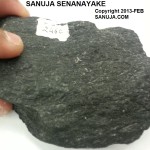The term “science” is referring to concepts, principles and theories that sprung out of logic. The logic adhere (at least it should be) to scientific method, which is a set of rules that standardize how data is collected and analyzed. The standardization of methods supposed to streamline the evaluation and peer-review of materials in question. Sounds simple, but in reality the evaluation of scientific work can be questionable.
Depending on who mark the paper and what “mood” the evaluator was in during the marking, a scientific paper (or a report or peer evaluation) can be given a 90% or 50%. Since the Geoscience is a field that involves a high degree of interpretations, the evaluation schemes seems to be highly unstandardized from one student to another. For example, if a mineralogy student writes that a hand sample has 35% quartz and 75% k-feldspar, the evaluator has to make a determination on the acceptable range of percentages for each mineral. The composition of the rock is subjective since one has to make an educated guess with relative to total composition. Unless the student is given an X-ray microscope, the analysis won’t be precise. Add to the complexity, the grading scale itself is often flawed because each evaluator marks the exact same question differently.
This is a growing problem in all fields. While one can argue the subjective evaluations are found in Arts and Philosophy programs, it is difficult to ignore consequences of unstandardized evaluations in science. Students from all science programs come under critical evaluations whenever there is a written portion that requires analysis. Personally I have experienced subjective grading in Geology, Geophysics, Physics and Chemistry. When I compared my assignments with fellow students, sometimes I was graded unfairly while on other times, they were graded unfairly. Even when instructors give an opportunity for students to revaluate the midterms and final exams, students talks about “moody days” verses “happy days”. If a student request for a reevaluation of the grading, whether or not the verdict favor the student, depends on the day, time and how the instructor feel at the time of the meeting. Some students talk of being “friends” with evaluators and professors in order to “earn” their respect for future favorable verdicts on evaluations. This often leads to misjudgment of students’ abilities as a critical thinker.
The objective of assignments and exams are to evaluate critical thinking of students. It should not be used as tool to crate a pseudoscience out of valid scientific theories. If science programs like Geology requires a significant amount of subjective thinking, educators should remove these programs from Faculty of Science all together. The Geology should be an Art and Chemistry lab reports that are based on writing skill rather than presentation of analytical data should be moved to Arts options. It is highly misleading to call something scientific when the grading system cannot be repeated over and over on several hundreds of students. According to the conventional scientific method, when an experiment cannot be repeated, it is a pseudoscience. Why not apply the same scientific principle to the grading system at our educational institutions?
As a student enrolled in Geology degree program, I came across several instances where written exams were marked differently based on no legitimate reason. At one point I have received a grade of 65% when all my friends who wrote the exact same thing in a different way received 90%. The discrepancy cannot be explained in any logical means since the difference between the two grades are significant. It seems like very few instructors allow their students to appeal fairly on grading schemes. If the scientific work is not evaluated properly, we should move all subjects under “science” into “arts” or create a new department, the “department of pseudoscience”.

